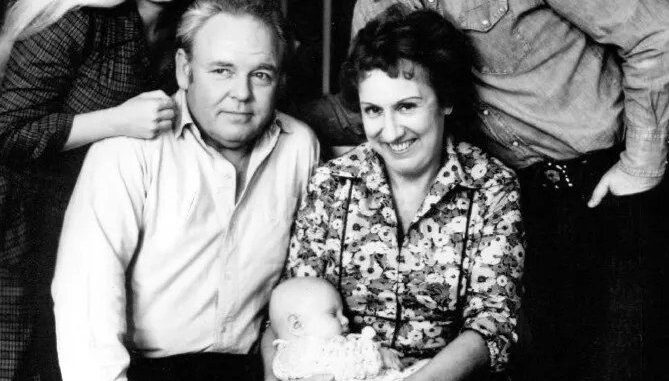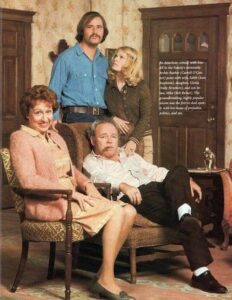
For five years, All in the Family, which aired on CBS from 1971-1983 (in its last four seasons under the title Archie Bunker’s Place), was the top-rated show on American television, and the winner of four consecutive Emmy Awards as Outstanding Comedy Series. All in the Family was not only one of the most sitcoms in history, it was also successful one of the most important and influential series ever to air, for it ushered in a new era in American television featured by programs that did not shy away from addressing controversial or socially relevant subject matters.
All in the Family’s storylines centered on the domestic concerns of the Bunker household in Queens, New York. Family patriarch and breadwinner Archie Bunker (Carroll O’Connor) was a bigoted loading dock worker disturbed by the changes occurring in the American society he once knew. To Archie, gains by the “Spades,” “Spics,” or “Hebes” of America (as he referred to Blacks, Hispanics, and Jews, respectively), came at his expenses and that of other lower middle class whites. Countering Archie’s harsh demeanor was his sweet but flighty “dingbat” wife, Edith. Played by Jean Stapleton, Edith usually endures Archie’s tirades in a manner meant to avoid confrontation. But that was hardly the case with Archie’s live-in son-in-law Mike Stivic (Rob Reiner), a liberal college student who was married to the Bunkers’ daughter, Gloria (Sally Struthers). The confrontations between Archie and Mike (“Meathead”) served as the basis for much of All in the Family’s comedy. As surely as Archie could be counted upon to be politically conservative and socially misguided, Mike was equally liberal and sensitive to the concerns of distress and the stressed, and, because both characters were extremely vocal in their viewpoints, heated conflict between the two was assured.

Producers Norman Lear and Alan (Bud) Yorkin brought All in the Family into being by obtaining the U.S. rights to the hit British comedy series, Till Death Us Do Part, which aired on the BBC in the mid-1960s and featured the character of bigoted dock worker Alf Garnett. Lear developed two pilots based on the concept for ABC, with O’Connor (Mickey Rooney had been Lear’s first choice to play Archie) and Stapleton in the lead roles. But when ABC turned down the series, then known as Those Were the Days, it appeared that it would never get off the ground. Luckily for Lear and Yorkin, CBS President Robert D. Wood was in the market for new shows that would appeal to the more affluent, urban audience the network’s consolidated lineup of top-rated but aging series failed to attract. As a result, CBS jettisoned highly rated programs like The Red Skelton Show and Green Acres in an effort to improve the demographic profile of its audiences, and All in the Family seemed a perfect, though risky, vehicle to put in their place. CBS therefore made a 13-episode commitment to air the series beginning in January 1971, as a midseason replacement.
The network had good reason to be wary of reaction to its new show. All in the Family seemed to revel in breaking prime time’s previously unbreakable taboos. Archie’s frequent diatribes laced with degrading racial and ethnic epithets, Mike and Gloria’s obviously active sex life, the sounds of Archie’s belching and of flushing toilets–all broke with sitcom convention. They also made people sit up and take notice of the new CBS series. In fact, its unconventionality caused All in the Family’s pilot episode to consistently rate below average in research tests conducted by both ABC and CBS. Nevertheless, CBS went ahead and debuted the show on January 12, 1971, though with relatively little fanfare or network promotion.
Viewer response to All in the Family was at first tepid. CBS’s switchboards were prepared for an avalanche of calls in response to the show’s initial airing, but this onslaught never materialized, in part because of the poor 15% audience share garnered by the first episode, which put it a distant third in its time period behind movies on NBC and ABC. But while the show continued to languish in the Nielsen ratings in its first few months, TV critics began to take notice. Despite the negative reviews of a small number of critics, such as Life’s John Leonard (“a wretched program”), the critical response was generally positive. Combined with strong word-of-mouth among viewers these evaluations help the show’s audience to slowly grow. The May 1971, Emmy Awards helped to cap All in the Family’s climb. The midseason replacement was featured in the opening skit of the Emmy telecast, and earned awards in three categories, including Outstanding Comedy Series. All in the Family shortly thereafter became the top-rated show in prime time, and held onto that position for each of the following five seasons.